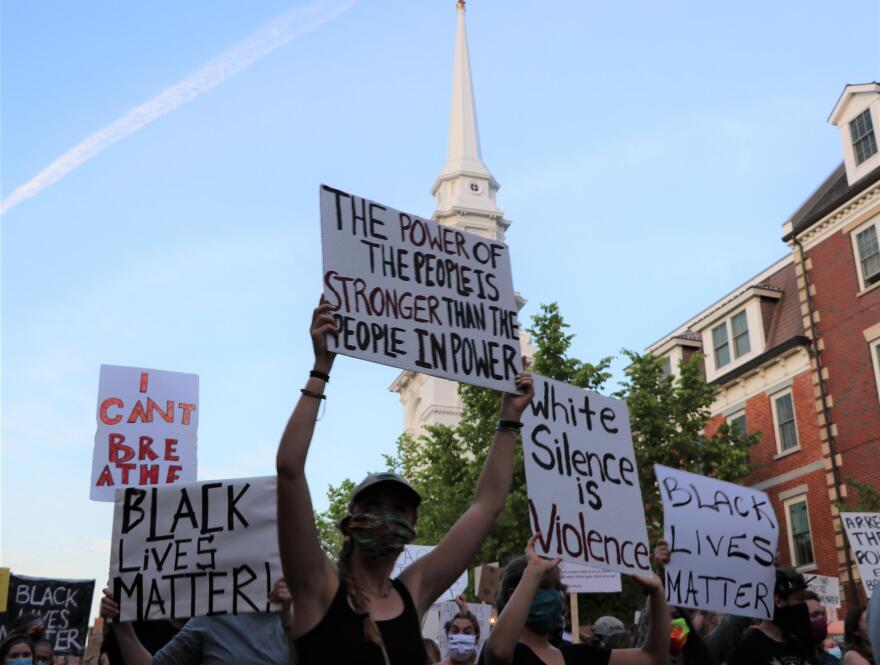The Seacoast chapter of Black Lives Matter has released a list of demands it says candidates running for office in this general election must deliver. Among them, legislation that would legalize cannabis and expunge convictions for some cannabis related infractions, outlaw qualified immunity for police officers, and mandate the collection of demographic data on a range of police interactions with the public for minor traffic stops to arrests.
For more on this, All Things Considered Host Peter Biello interviewed Clifton West Jr., one of the founders of Black Lives Matter Seacoast.
Subscribe here to NHPR's newsletters for more New Hampshire news and information.
(Below is a lightly edited transcript of the interview.)
Peter Biello: So what prompted you to list these demands now?
Clifton West, Jr.: I think it was a great time post primaries to really keep the candidates and the voters thinking about significant change that is needed to happen in our communities. So that was kind of the virtual idea that we had and it kind of morphed into a list of demands that we want each level of our government to take. So I guess that's what kind of prompted it, we got tired of waiting for change.
Peter Biello: And you're targeting candidates running for office in a variety of positions and you break down the demands by office that they're seeking. Do you feel there's one office that has a particularly high potential to create the kind of change that you're looking for?
Clifton West, Jr.: Really, the State House has a lot of power, but also the selectmen board and the city council has a lot of power within that particular town. I think it's hard for me to take which one would be more significant because I think they all kind of intertwine with one another, like you need the drug laws to change for the on the ground officers to not be arresting people that carry how many ounces of marijuana or whatnot. So we need a state House for that to change its overall drug laws and those overall training materials that those officers get.
Peter Biello: And you're shining a light in this list of demands on a few officers that don't often get a lot of attention. And one of those is the race for county attorney. What would you like to see from county attorneys running for office?
Clifton West, Jr.: Pretty much on the county attorney level, I feel like by the time we get to that place, the officer would be telling their decision... there's a certain level of bias that goes into arresting, approaching an individual, and by the time he gets to know that bias, that all will be implied. So one of main things is taking into consideration racial bias, that prosecutor or the county attorney's office, and the county attorney's office, is to receive training for implicit bias and systematic racism.
Peter Biello: Well, let me ask you about the the towns, because you've been critical of some towns for issuing statements that announce things that align with what Black Lives Matter supports, you know, commitment to eliminating racial inequities, as Dover City Council has said. But you've also been critical of those same towns for not doing more, for not going beyond those statements. So what would you like to see from town council specifically that would that would go beyond those those statements?
Clifton West, Jr.: Action. I would love to see more of a commitment to assure diversion programs. I know the Dover police works with S.O.S Recovery Organization on a lead program where the officer gets to determine whether this person goes to jail or they go to this facility for drug abuse. We need to see more detailed reports on spending, on budgeting and make those available to the public.
We need to see an actual investment into these social services. It really .. it goes beyond just saying, hey, Black Lives Matter.
Peter Biello: There are people out there who refuse to say that systemic racism is even a problem in New Hampshire. Oh. What do you say to those people who say that this problem doesn't exist here in the first place?
Clifton West, Jr.: I would tell them to talk to black and brown people in this community. And if you are talking about New Hampshire, you're talking about Claremont, that a black person was almost - a black kid was almost lynched in that town a few years ago. Then in late 2018, you have the individuals from Dover High School who thought for a class assignment it would be amazing to sing a KKK song to the tune of Jingle Bells. Then you have all these little incidents that pop up and you have parents - I know a parent, I talk a parent like almost every day. She had to pull her kid from school, pull a black kid, a black child from school, because the bullying was affecting her mental health to the point that she was [crying] herself. Really to those people, you're not going now because you not a BIPOC individual, so you need to talk to them and reach out.








